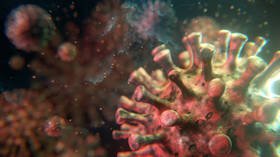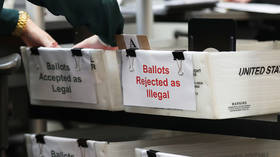Coronavirus antibodies wane after initial wave, casting doubt over immunity hopes – UK study

New research has found that coronavirus antibodies drop substantially over a short period following the initial wave of infection, casting yet more doubt over the possibility of herd immunity.
A major study led by Imperial College London, involving 365,000 participants in England and conducted between 20 June and 28 September, showed the number of people testing positive for antibodies fell by over 25 percent across the study period – from almost roughly six percent to 4.4 percent.
The downward trend was observed in all areas and across all age demographics, except for healthcare workers, which probably indicates higher initial exposure to the virus, or repeated exposure, among this group.
The Real Time Assessment of Community Transmission (REACT) study involving home-administered finger-prick tests showed the decline was slower among 18-24 year-olds versus people aged 75 and above. Antibodies indicate when a person has previously been infected with the virus and are a useful marker to show how far a virus has spread among a population.
Those with asymptomatic Covid-19 infections appeared to lose antibodies faster than those who showed symptoms. In other words, antibody response, which varies by age and severity of infection, wanes quickly over time regardless of outward symptoms, according to the research.
Also on rt.com ‘We’re not there yet’: British health minister dashes hopes AstraZeneca vaccine could be ready before Christmas“Our study shows that over time there is a reduction in the proportion of people testing positive for antibodies,” said Professor Paul Elliott, head of the program at Imperial.
“Testing positive for antibodies does not mean you are immune to COVID-19,” he cautioned.
Also on rt.com Former UK Brexit secretary reveals ‘disaster’ test and trace companies don’t face penalties for failuresElliott added that it remains unclear what level of immunity antibodies provide, if at all, and for how long this immunity might last.
Regardless of their antibody status, people are still required to socially distance, get tested if they display symptoms and wear face coverings as and when required.
Some 17,576 positive results were recorded among participants during the study period, 30 percent of whom self-reported as asymptomatic. London had the highest proportion of positive tests, at double the national average.
"We don't yet know whether this will leave these people at risk of reinfection with the virus that causes COVID-19, but it is essential that everyone continues to follow guidance to reduce the risk to themselves and others," Professor Helen Ward, one of the lead authors of the report.
The concept of “herd immunity” has long been touted as an alternative strategy for dealing with the coronavirus pandemic, as opposed to lockdowns while awaiting development of a vaccine, however, there is mounting evidence that runs contrary to this proposal.
WHO chief Dr. Tedros Ghebreyesus has earlier this month warned policymakers using the principle of herd immunity to stem the COVID-19 pandemic is “unethical” and “not an option” countries should pursue to defeat the virus.
Also on rt.com Letting coronavirus spread freely for ‘herd immunity’ is unethical, says WHOThink your friends would be interested? Share this story!














